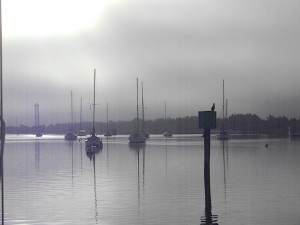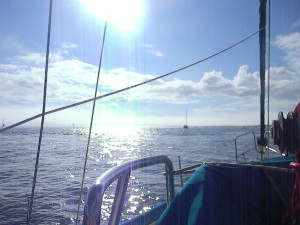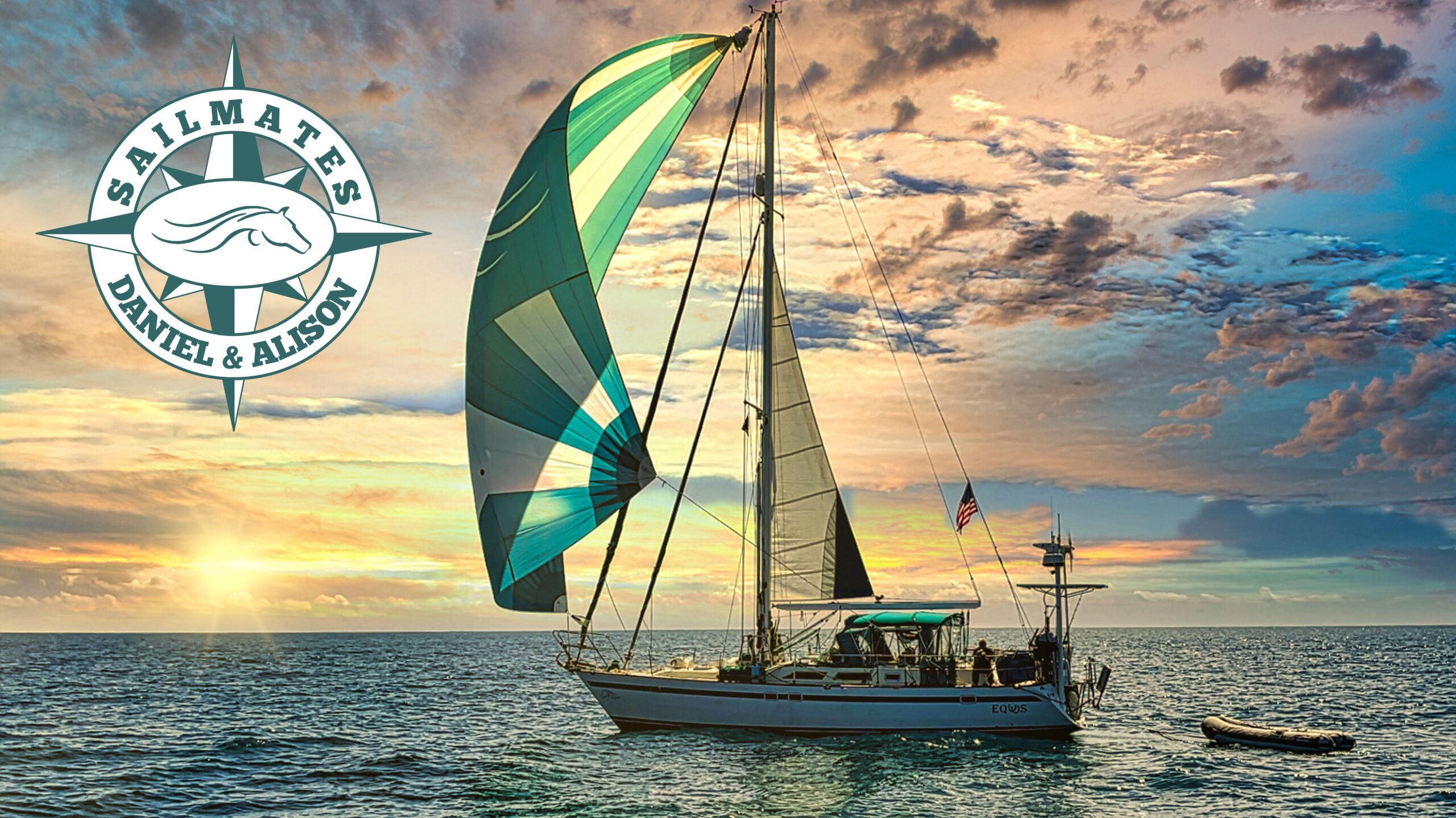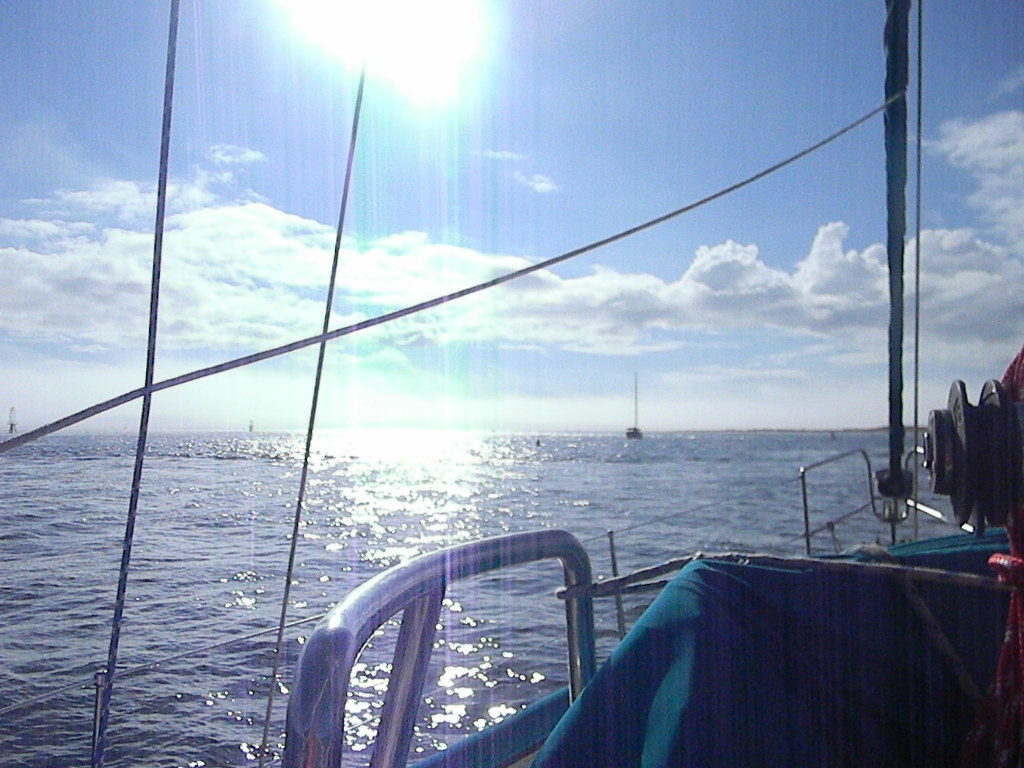“I’m not so much a dragon slayer, more a dragon annoyer – I’m a dragon irritator.” Craig Ferguson
Our first dragon was in the form of an impending storm forging down the Gulf Stream, the route we were planning to sail our newly purchased Taswell 43 from Brunswick, Georgia to New Bern, North Carolina. It had yet to be decided if we would indeed arrive in New Bern before the arrival of high winds and heavy seas. We began our journey after what was not the smoothest of departures. Yet, hopes were high as we headed out toward the Gulf Stream under a foggy, moon-vacant, pitch black sky. We had asked Neptune to grant us a safe passage, which he did, but we had a few dragons to irritate along the way.
Immediately following our first “Captain’s Hour”, the four of us diligently sought out the channel markers guiding us away from the coastline and out to open water. It was difficult picking out the dark markers against a darker sea. Red markers on the left, green makers on the right, we strained to locate each mark as the seas rolled under us, tossing our boat up and over each wave. Finally, no more markers appeared and we set a northeast course. Winds were not favorable for hoisting the sails. For now, our motor faithfully pushed us forward into the unknown. It was slightly unnerving watching the last glimmer of tiny lights disappear from the horizon, knowing we were venturing off into the ocean, never having sailed the boat on our own. We clung to the only lifeline we had tethering us, the quality of our boat, the experience of our captain, and the tenacity of the crew. Unfortunately, my fight with the next dragon ended with: Dragon 1 – Me 0. I met the ugly green monster whilst trying to prepare dinner in rolling seas. Not the brightest idea, I now realize. But in my defense, it was time for the first meal aboard our vessel and the crew was hungry. I felt I would be letting them down by not preparing a hot meal. Besides, I told myself. I had never been seasick before.
As my mother so wisely states, “The only thing you are afraid of when you are sea sick, is that you won’t die.” Unfortunately, I can now validate that claim. Somewhere in the middle of trying to chop onions and peppers, my nephew Ryan came below and asked if I needed help. I didn’t actually feel sick yet, but my senses foretold that if I remained below being tossed about while trying to prepare fragrant foods, it would not be long before I was. Reluctantly, I handed over the galley to Ryan. He assured me he would have no trouble cooking in the rough conditions. I immediately went topside and breathed in the cool sea air and tried to stare at the horizon. The problem was, we were motoring at night in a sea of inky darkness where no horizon could be discerned. An hour later, Ryan appeared with four hot, steaming bowls of rice, veggies and sausage. By this time, I was as green as my dragon friend. I couldn’t look at the food, never mind eat it. Since my watch with Al was the midnight to 4:00, I decided I would go below to my bed and try and get some sleep.
My internal clock amazes me. At five minutes to midnight, my silent alarm roused me from my sleep. I sat up and felt the turmoil brewing in my stomach. I can fight this, I told myself. I just need to get topside and focus on navigating. Al was already on watch as he had napped on the cockpit benches. When I appeared, a disheveled groundhog popping out of my hole, everyone could see I was not feeling well. As Dan and Ryan unhooked their harnesses (we always tether ourselves to the boat during night watches) I had to ask what to do if in fact, I did have to get sick. “Just heave over the side of the cockpit. I just did,” Al replied. The instant Dan and Ryan descended the stairs, the mere thought that Al had just gotten sick forced my tenuous state. The ritual continued for the entire duration of my 4 hour watch. By the time I went below to wake Dan for his watch, I was exhausted and had not an ounce of content left in my stomach. In tears, I informed Dan of my condition and asked what I should do if I continued to get sick. He handed me a bucket, tucked me into bed, and told me to try and get some sleep. The next 24 hours, I remained in the bed, sick as a dog and wanting to die. Dan tried to get me to go above and get some fresh air, but not even that helped. I was fearful of becoming dehydrated and let Dan know if I continued to be sick at this rate, he was going to have to intervene. I recalled the words of an Elton John song, Better Off Dead, “You’re better off dead if you haven’t yet died!”
As the morning light appeared above the expansive horizon of the Atlantic Ocean, the non vomiting crew members were welcomed by a beautiful morning. The sun made a brief appearance, while I made none. Despite Dan’s coaxing, I chose to remain draped across my bed in a sweat soaked, exhausted heap. I begged Dan to throw me overboard and find another wife to sail around the world with, but alas, he said he didn’t have any other candidates. After a brief visit by the sun, the clouds rolled in and the weather began to deteriorate. Before conditions worsened, Ryan took the opportunity to set 2 fishing lines out, hoping to snag some big fish in the Gulf Stream. FoxSea Clipped along at 7 to 8 knots, a gentle breeze on our nose. The rain eased into place, dropping intermittent showers on our lonely little boat in the midst of a vast blue ocean.
Captain Dan decided not to set a watch schedule during the day, as long as there was someone alert in the cockpit. In reality, the remaining 3 crew members were usually awake and in the cockpit as people tend to remain on deck, sometimes taking cat naps to recharge their batteries. The crew fended for themselves for breakfast and lunch. Al, still a little queasy from the night before, was content with fruit and yogurt. Ryan and Dan still retained their appetites and cooked eggs and bagels for breakfast and made sandwiches for lunch. As the rain came down, the crew discovered an item on the boat which would need some repair. The bimini did a wonderful job of collecting the rain that fell upon it, forming it into large drops which it then deposited on the crew. A good dose of waterproofing would be required to make it useful as something other than a sun shade. Donning their foul weather gear, the crew still remained upbeat. The day passed by uneventfully. Ryan and Al read books, Dan plugged in points on our chart plotter. The chart plotter is a navigational system that uses a GPS signal to put the boat’s position on an electronic chart. We could use it to plug in way points and determine our compass direction, which in navigation terms is the bearing. This was necessary to take into account the current, which alters the course. At times we were pointed 10 to 15 degrees different than the bearing in order to maintain a true course to the waypoint. Adjustments were made occasionally to our autopilot to keep us heading in the right direction. Dan was very happy with both the chart plotter and auto pilot. We motored along peacefully, waves fairly benign. Other than not being able to put up the sails, and me being sick as a dog, things were going along smoothly.
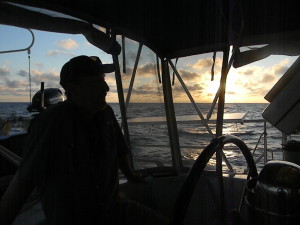
Evening arrived, and with the darkness came the important task of night watches. In the light of day, the monotony was broken by sighting an occasional ship passing within a few miles of us. At night, when the radar detected a ship, it became crucial to keep an eye on both our courses and make sure we had no chance of meeting paths. Usually, the ships passing at night are gigantic merchant vessels. Dan, having worked on merchant ships, assured us that these vessels often had no clue there was some small sailboat in their path. It was up to the night watchman to keep an eye on the situation and alter our course if necessary, keeping a safe distance between us and any ships. With the loss of a crew member, Dan decided to split the night watches into three individual watches, 8 to 12, 12 to 4 and 4 to 8. Each person would be alone on deck for their evening watches. Dan and Ryan cooked up a gluten free spaghetti dinner and the crew settled down for the evening.
The shipping traffic increased. Every watch was busy with multiple targets on our radar. Each crew member was accompanied on their watch by hosts of stars and constellations. Being out at sea and having no ambient light, the stars were so bold and bright it seemed one could almost reach out and touch them. Occasionally, a shooting star would blaze across the sky, some of them so close you could hear the crackling and sizzling as they entered the atmosphere. It was during the last night watch, when Al was posted in the cockpit for his 4 to 8 watch, that my dragon finally decided he had beaten me to a pulp and relinquished his grasp. Awaking at 5:30 AM, and not feeling queasy for the first time in 24 hours, I made my way up to the fresh air and was greeted by the very first light, foretelling the eminent emergence of the sun.
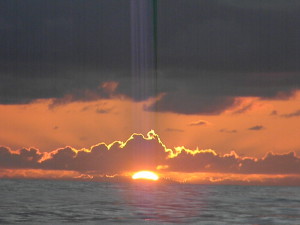
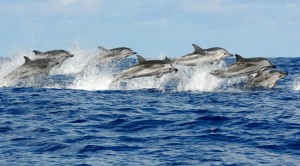
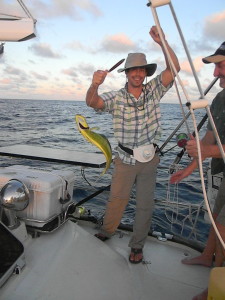
Our course change to the north finally put us on a broad reach and allowed us to put up the sails. The jib pulled out smoothly and it was gratifying to finally see white canvass billowing in the sky. Next, Captain Dan ordered the mainsail to be hoisted. This presented a problem. The engine was still running as we needed to keep up our speed to maintain our timeline. We call this motor sailing, sails helping with the speed but the engine propelling us forward as well. Al and Ryan were working with the main, which was furled in the mast. Mast furling and boom furling main sails are a source of debate for many sailors and we soon learned the reason. Typically, a sail is raised and lowered by halyards. When the sail is down it is lashed to the boom. The benefit of sails tucked away in the mast or boom are that the sails are protected from the elements, no sail ties are required, and in the event you have to reef or reduce sail area during heavy winds, no need to walk up the deck to do that. You simply roll part of the sail into the mast or boom from the safety of the cockpit. The downside? What happens when the sail gets stuck? Al and Ryan, pull as they may, could not get the main to unfurl. Both men went to the source, where the sail came out of the mast, and pulled, wiggled and cajoled. The sail would not budge. Finally, we took the line that pulled the sail out and wrapped it around a winch. Ryan and I used a winch handle and with all our might fought that battle. Slowly but surely, we coaxed the sail out of her hiding spot. Finally, we had both sails up, the boat now cruising softly over the waves for the first time in 3 days. When sails are up, the boat glides smoothly over the waves as opposed to running with the engine which forces her abruptly in more of a pounding motion. We all breathed a sigh of relief to finally be under sail, the motor purring quietly in the background, quietly that is, until she became too quiet. Without even so much as a hiccough, the engine abruptly died. The silence after three days of hearing the engine going, was deafening, the implications terrifying. We would be arriving in Beaufort in the dead of night and there was no way on Earth we could navigate through the shallow and winding inner waterways under sail. We had about 2 hours until sunset to figure out why the engine died. We were about 40 miles from shore and still well out of cell phone range.
The men quickly went to work going through all the possible scenarios of why the engine would die without hesitating first. The most likely solution was that we were out of fuel. Recalling the fact that we had no fuel gauge, we were never sure we had totally filled the tanks. Being the prepared sailors that we were, 3 five-gallon fuel cans were lashed to our stern for just such an emergency. Dan and Ryan poured 2 of the cans into the tank and we tried to start the engine. Fingers crossed, holding our breath, we put the gear in neutral and push the starter button. Silence. Not so much as a rumble of recognition from our mighty engine. Just then, our trusty autopilot began blinking a warning message. We quickly turned it off and Al took the helm. Engine gone, autopilot on the blink, darkness encroaching, we wondered just what we had done to piss off Neptune.
More than an hour later, and after troubleshooting a variety of possible engine failure scenarios, all engine compartments on the boat were open, and parts were strewn all over the interior of the boat. The men had replaced what they thought were clogged fuel filters. If the fuel had gotten low enough, sludge from the bottom of the tank could have caused the filters to fail. It was the last item from their bag of tricks. They could think of nothing else to do. Praying this last step would bring the engine back to life, everyone gathered for the fateful moment. Daylight was slipping away and soon we would be plunged into darkness, our distance to the shore quickly reducing. Dan put the gear in neutral and Ryan hit the button. In that pregnant moment, everyone waiting for the much awaited sound of the engine rumbling to life, the silence was shattering. Nothing, nada. “Try it again, in forward gear this time,” Al suggested, grasping at straws. I mouthed silent prayers, “Please, please start,” as I envisioned having to call emergency services in the middle of the night and having to be towed to safety. Ryan pushed the button. Still nothing. “Throw it in reverse!” Al shouted. Dan looked skeptical as he pushed the lever all the way down, and into reverse. He nodded to Ryan who shrugged, and pushed the button again. BRRROOOOOOM, and then a sputter and silence. But at least the engine kicked over and we now had hope. A few more adjustments to fuel filters and few other magical things that the mechanically un-inclined such myself couldn’t comprehend occurred, and in a few more attempts and we were welcomed by the sound of a running engine. US:1 – Dragon: 0.
We took the sails down on our approach to Beaufort, the lights of the towns along the shore a welcome sight. Now for the difficult part, navigating in the dark through passageways notorious for grounding boats in good conditions during daylight. We got out the spotlight to identify marks and discern if they were red or green. We had to keep red on our right and green on our left re-entering the waterway. The chart plotter in front of Dan showed a maze of markers, many of them twisting and turning sharply to the right and left. It was going to be tough. We used the spot light to shine on each marker to give Dan the path we needed to travel. The downside was that each time the light was shone, Dan’s night vision was temporarily diminished. He needed to be acutely aware of his distance from each mark as one small slip in navigation and our boat would be grounded. The channel was several miles long and Dan gripped the wheel, making decisions with only split seconds to spare. Over an hour later, nearing the 1:00 AM mark, we finally entered the Beaufort harbor. She was a beautiful sight to behold. We were eternally grateful for arriving safely. Last but not least, we had to drop our anchor so we could all crash and get much needed sleep before our last day’s journey through the Pamlico Sound. We didn’t have experience with an anchor windlass as we had always used manual anchors with a small section of chain, and the majority of the feed out being line. Our new anchor was attached to a massive amount of chain. It took us several attempts to figure out how much chain was actually deployed and to get into a safe location. Each failed attempt we had to pull the anchor back up, re route the boat back into position and try again. We were mentally and physically exhausted by the time she actually took but not too tired to hoist a celebratory glass of wine in recognition of all our victories.
